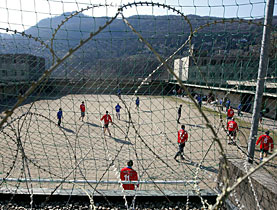Parliament moves to tighten criminal law

The House of Representatives has decided to re-introduce short jail terms as part of moves to crack down on crime.
Legal experts have cautioned against a new radical overhaul of measures which only took effect less than 30 months ago.
Wednesday’s debate ended with a victory for the supporters of a tougher penal system, particularly among the rightwing Swiss People’s Party as well as the centre-right Christian Democrats.
The House voted to tighten sanctions against criminal foreigners, against paedophile offenders and drivers convicted of speeding and called on the government to outlaw certain violent computer games.
Luzi Stamm of the People’s Party told swissinfo.ch that he was pleased with the outcome of the debate, in particular the re-introduction of prison sentences of less than six months and the proposal to set up fast-track courts.
However, he regrets that the House narrowly refused to abolish a system of so called day-fines, calculated on the income of an offender. In this system, convicted persons are sentenced to pay for each day that they would otherwise have spent in prison.
For his part, Daniel Jositsch – a member of the centre-left Social Democratic Party and professor of criminal law – has mixed feelings about the plenary discussions.
He welcomes the approval of motions aimed at examining the sentencing practices of courts and moves to extend preventive and educational measures for juvenile delinquents.
But he has serious reservations about a plan to increase the minimum prison sentences for certain crimes. Asked to comment on the tone of the plenary discussions he shrugged his shoulders.
The Social Democrats and the Greens had urged parliament to refrain from hasty and populist measures.
The other parliamentary chamber, the Senate, will discuss the package of proposals next week.
Leniency
Justice Minister Eveline Widmer-Schlumpf agreed the current criminal law had a number of flaws.
“The penal system is widely considered to be too lenient with offenders,” she told the House.
She highlighted inadequacies in the law on juvenile crime and youth violence.
Widmer-Schlumpf also warned parliament against rushing to decisions and pointed out that moves were underway to evaluate the introduction of longer sentences for negligent homicide.
And she urged courts to use the full range of sanctions available.
Prevention
Martin Killias, a professor of criminology at Zurich University, has criticised Switzerland’s criminal law as too ambitious.
“It aims for perfectionism, but the system of day-fines rather than short jail terms has to cover too many different types of felonies,” Killias has said in several recent interviews to the media.
He said courts too often meted out suspended sentences, but he also pointed out that judges made frequent use of fines rather than handing down sanctions such as community service.
Laurent Moreillon – who works with Killias at Lausanne University – said the penal law lacked credibility.
“In most cases the system with fines is not understood and has no preventive impact for delinquents,” Moreillon told the Geneva-based Le Temps newspaper.
But he stopped short of calling for a complete overhaul of the criminal law.
Hans Wiprächtiger, a judge at the Federal Court, dismisses calls for the abolition of fines for petty criminals.
He says there is scientific evidence to prove that the severity of sanctions has little impact.
“Harsher sentences do not reduce crime. The chances of a relapse are unchanged,” Wiprächtiger said an article in the weekend supplement of the Tages-Anzeiger newspaper.
The debate in parliament came against a perceived rise in violent crime and allegations, made particularly by the rightwing, that courts are too lenient.
The House of Representatives discussed more than 80 proposals calling for reform of the criminal law.
The Senate is scheduled to discuss the package next week.
The current criminal law came into force at the beginning of 2007.
It abolished jail terms of less than six months and introduced a system of so called day-fines calculated on a person’s income.
It also introduced communal work as a sanction for offenders.

In compliance with the JTI standards
More: SWI swissinfo.ch certified by the Journalism Trust Initiative













You can find an overview of ongoing debates with our journalists here . Please join us!
If you want to start a conversation about a topic raised in this article or want to report factual errors, email us at english@swissinfo.ch.